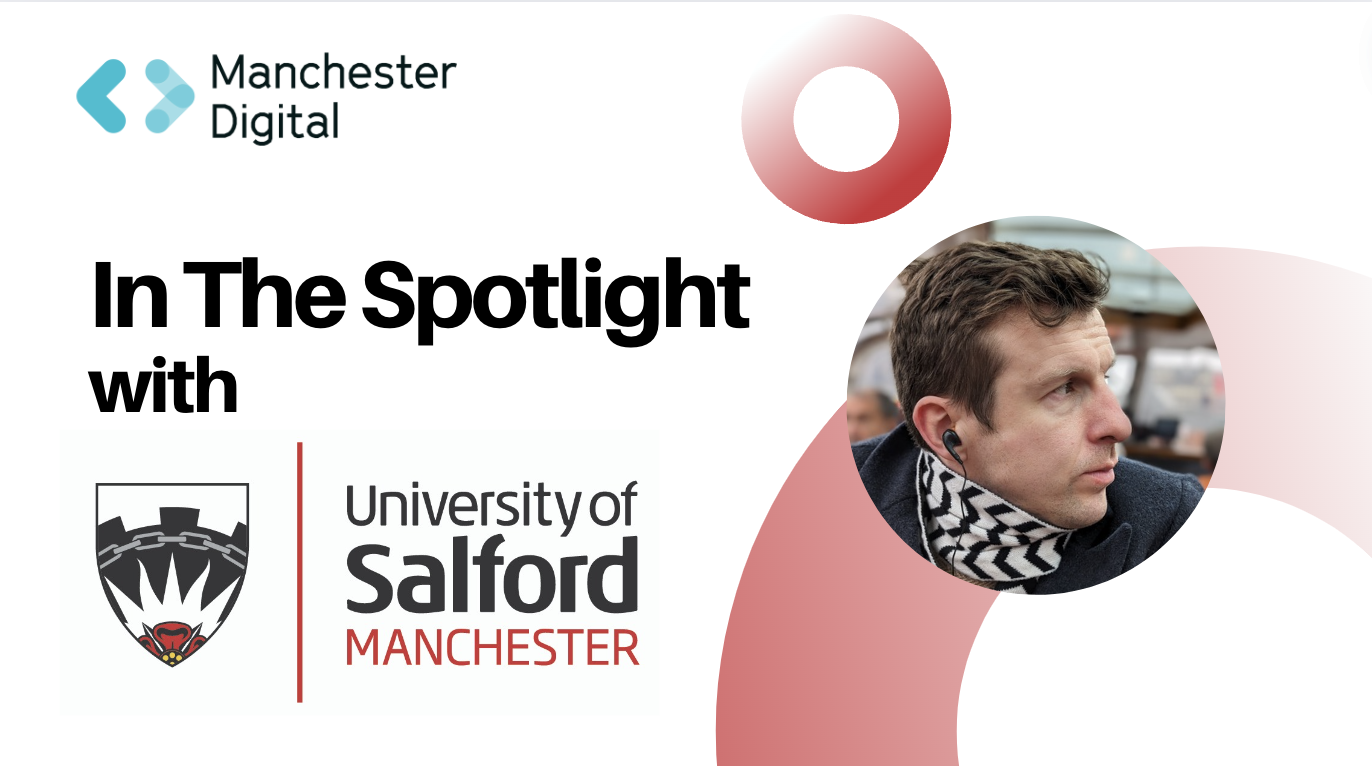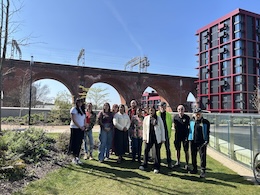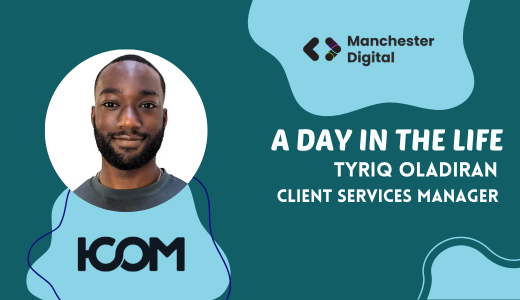
At Manchester Digital, we like to interview our members to find out a bit more about what they do and their work in the Greater Manchester digital and technology sphere. This week we're speaking with Luke Harrison, Academic Lead – Higher Technical Skills at the University of Salford.
The University of Salford has launched new digital and tech qualifications. Can you elaborate on the specific skills and knowledge these courses will equip graduates with to meet the evolving demands of the digital and tech industry?
Our Higher Technical Skills courses are designed to give hands-on, vocational training – for these courses, our students ‘Learn by Doing’. The qualifications provide a concentrated experience over one or two years and prepare students for immediate employment upon finishing their studies. We are the lead education partner in the Greater Manchester Institute of Technology (GMIoT) which means we are working in partnership with a variety of colleges and employer partners in the city region to develop courses that ensure our learners have real world experience and prepare them for the jobs of the future within the construction, engineering, health and digital sectors.
Some specific examples:
• DipHE Business Analytics
By studying this programme, students will develop a range of both technical and communication skills which will enable them to successfully fulfil the role of a Business Analyst. The programme has been designed in collaboration with major employers and throughout, learners will have the opportunity to work with employers on simulated and live projects, to develop skills, knowledge and experience. The programme is mapped to the Institute for Apprenticeships and Technical Education Occupational Standard for Business Analysts, meaning it develops in students the skills, knowledge and behaviours demanded by employers in this sector.
• HND Esports Business Management
This programme engages and inspires future talent to gain employment in a rapidly emerging industry. The fundamental aspects of esports are the cornerstone of the course, collaborating with grassroot online communities, esports tournament organisers, gaming innovators, publishers and working with national/ international governing bodies. Students learn in a bespoke immersive environment, built to host the digital requirements of the course. This includes an esports tournament arena, broadcasting equipment and an esports lab for teaching, learning, and gaming.
• DipHE Data Science (from Sept 2025)
This programme, mapped to occupational standards, introduces students to the fundamentals of Data Science and data analysis and gives them practical experience working with industry-standard tools, systems and programming languages. Students learn through hands-on exercises, group activities and live industry briefs, and work with messy, real-world datasets in realistic, problem-based scenarios
• DipHE Automation and Instrumentation (from Sept 2025)
This DipHE in Automation and Instrumentation offers a comprehensive curriculum covering basic maths, physics, programming, Industry 4.0, data acquisition and automation principles. This programme is mapped to occupational standards and prepares students for a flourishing career in the field of industrial automation, which is in high demand across various industries.
What was the thinking behind the design of these new qualifications? How did you identify the skills gaps in the industry and tailor the curriculum accordingly?
The University is keen to meet the future needs of learners and employers, which includes developing a portfolio that can support lifelong learning and skills development. The courses are designed to be applied, relevant and authentic. The Higher Technical Skills programmes can also offer a more accessible route through Higher Education as they are shorter and often delivered in a way that means learners can fit other commitments around their studies.
In terms of developing the programmes, a huge amount of work was done in setting up the GMIoT, and our own new programmes, consulting labour market data nationally, regionally and locally, and getting employers on board from day one. At Salford, we have well established sector boards working with our academic teams, and a long history of embedding industry engagement in the curricula.
The course content was advised on by people working in those areas and doing the jobs we want to prepare students to be successful in.
How will the University of Salford support graduates in transitioning from academia to the workplace? What kind of career services and industry placements are available?
Throughout their time at Salford, the students get to work on live briefs, undertake workplace visits, meet industry guest speakers, and are taught by active practitioners; they are closely connected to the workplaces they want to enter after finishing their studies.
As these programmes are practical and taught through applied learning, the students ‘study’ in the way they will be working when they graduate – the courses are designed to closely mirror what they would be doing in business.
All GMIoT students have access to enrichment activities that foster a sense of community as well as preparing them for graduation. As Salford graduates, our learners get full access to the alumni careers support and network.
How is the University collaborating with local businesses and industry bodies to ensure that the new qualifications align with the needs of digital and tech employers in the region?
We collaborate with local businesses and industry bodies in the development and delivery of the programmes. Through the GMIoT, students benefit from partnerships with employers such as Laing O’Rourke, Siemens, GCHQ, and we arrange regular guest speakers from and visits to Greater Manchester based SMEs.
The courses are developed with the help of industry leaders, meaning every module is carefully considered and will help build the skills needed by future professionals. We are also looking to achieve Higher Technical Qualification (HTQ) status for many of these programmes – a new national kitemark status awarded by the Institute for Apprenticeships and Technical Education.
Through our Education membership with Manchester Digital, we are hoping to develop and extend those conversations as we grow the portfolio and welcome more students looking to complete a higher technical qualification.
Why should regional employers prioritise graduates from the University of Salford's new digital and tech programs? What sets your graduates apart from other graduates in the field?
Students have chosen these courses because they are keen to learn skills in a hands-on way and get into the workplace quickly. They see the courses as a way into work and have a real enthusiasm for the industries as well as the course content. They have studied on a programme designed to equip them with the skills the employers are telling us they need.
Find out more about the University of Salford Higher Technical Skills programmes here.
Thank you Luke!
Find out more about the University of Salford here.









